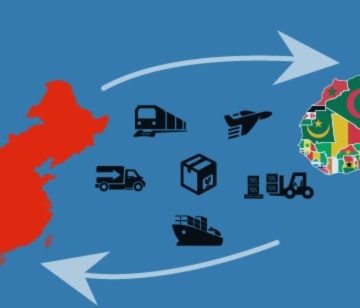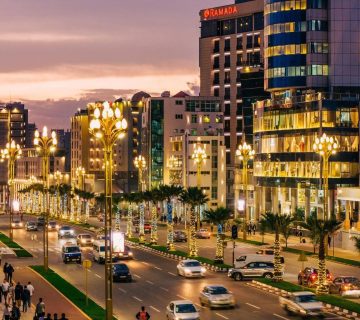In September 2021, Angela Merkel walked off the European Union stage. While Germany’s new Chancellor Olaf Scholaz, Angela Merkel’s former deputy, is expected to maintain Germany’s influence in the European Union (EU) and Africa, it is France’s president, Emmanuel Macron who is projected by some European experts to be the most influential figure in the bloc. Macron was already exerting his own influence when the bloc sided with France on issues such as energy. Still, other experts, as highlighted by the New York Times, believe that the EU will not have a clear figurehead, since neither Macron nor Scholaz will be as influential as Merkel.
Britain, Germany, and France have in the past influenced the bloc’s policies. Germany and France are expected to continue this norm. If Macron secures re-election in April 2022, he will likely continue to promote France’s agenda on security and migration. No matter the outcome of this race for influence in the EU between France and Germany, Horn of Africa-EU relations will be affected. The relationship between Africa and EU has always been criticised for being inequitable and unequal. France, for example, has historical controversies that are linked to colonisation. For instance, their military engagement in Mali has in part sparked protests by the youth who are calling for the abolition of the CFA Franc and a review of the bilateral defence agreement.
The net flow of resources between Africa and Europe have also remained in the latter’s favour; fundamentally characterized by debt-servicing or macro-economic policies, and unequal terms of trade. Both Macron and Merkel have pushed for increased economic engagement between African states and their respective European nations to boost the economies of African states in order to stem the number migrants moving from Africa to Europe. These agendas around security and migration affect the Horn of Africa as the states in the region are both sources of migrants and transition points. Initiatives such as the Khartoum Process, which is a partnership between the European Commission (EC) and the African Union Commission (AUC), have been created to enhance efforts against human trafficking.
Merkel’s legacy in Africa has been mixed, with criticism that African states have not been engaged as equal partners in trade with European states. On the other hand, Macron’s agenda in Africa has been questioned. Macron’s administration maintains a relationship with Franco-phone Africa which has been criticized as pervasive in nature, while he has made no clear stand on relations with Anglo-phone states. Thus far, it appears that Scholaz’s government has not made any major statements with regard to changing German dynamics with the Horn of Africa region.
As France will be holding the EU presidency in January 2022 to June 2022, Macron will have time on the international stage, to win over the French and EU public at large. He has put his efforts in encouraging relations between Africa and EU in a bid to promote his policies on this matter. African governments are tasked by their nationals with ensuring they take advantage of these shifting political powers and get deals that finally shift the core-periphery order of affairs. To become an equal partner with the EU, African states can leverage the natural resource needs that the EU has and ensure that equal value is returned to the continent, through balanced trade agreements.
France’s Recent Engagement in Africa
Macron’s time in office has been spent rebalancing and broadening the engagement of France with the Horn of Africa to strengthen France’s position on the continent and reassert influence on the broader international stage. He has done this by establishing the Presidential Council for Africa, with the aim of offering advice over the issues affecting African states and help shape France’s foreign policy. With host representatives from the Horn of Africa, such as Yvonne Mburu from Kenya.
In the past there has been a focus on Francophone Africa, however Macron recognizes that the landscape in Africa has shifted with the political and economic influence that China holds on the continent, and how easily France can be side-lined. France has increasingly engaged in trade with Anglophone States as well, such as Egypt, South Africa, Nigeria and Ethiopia, whom 30 per cent of its exports went to in 2019.
Macron has also visited Africa several times since his assumption to office. In 2019, he was in Kenya, marking the first visit by a French President in the state. He announced new deals worth an estimated US $3.4bn, which included transport infrastructure project, a solar power plant, and a maritime surveillance project. These projects are underway. Furthermore, France has sided with Kenya in Kenya-Somalia Maritime Conflict. Recently France has engaged in the 160 Billion Kenya shillings project 233 kilometre Rironi-Nakuru-Mau Summit Road toll highway from Nairobi to Mau Summit.
The EU: Security and Migration in Horn Africa
The EU has a Strategic Security Partnership with Africa through the African Union (AU). Traditionally this engagement has always dealt with poverty reduction, economic and trade cooperation, and integration. Revisions of the Cotonou Agreement between the two blocs has introduced terrorism, proliferation of weapons, and the underlying interdependence between security and development. The security policy of the EU directs us on the interest that France and Germany have in the Horn of Africa region.
Leading states in the EU such as France continue to propagate the core-periphery system of trade and development assistance as their preferred mode of engagement with Africa, they have also strategically engaged in efforts towards supporting peace, security and stability particularly in conflict-prone region of the Horn of Africa and Sahel. This helps alleviate Africa’s migration problem as well as insecurity that impedes developmental progress in the continent. It is also strategic for France’s ambitions towards promoting their national interests via EU policy towards Africa. The states in the Horn of Africa equally need to push for partnerships that are equally beneficial with France and the EU, at the bilateral and multilateral levels. The engagement of states like China is strategic for the region, as it allows states to have the power to negotiate deals that express their national interests.
Raudhat is a Research Assistant at the HORN Institute
Photo: Emmanuel Macron with Angela Merkel at a past event (Photo Credit: Financial Times)
The contents of this article are copyright of © The HORN Institute 2022. All rights reserved. Any redistribution or reproduction of part or all of the contents in any form and for whatever reason is prohibited. You may use the content of this article for personal reasons, but acknowledge the website as the source of the material.



